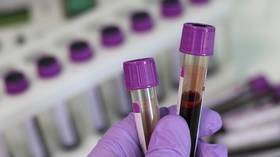It’s in your blood: New Alzheimer’s test lets doctors detect dementia in ‘under 1 hour’

A team of scientists claim to have developed the world’s first blood test that can detect Alzheimer’s disease. The pioneering method may prove vital in dealing with the impending dementia crisis the world could face this century.
The Amplified Plasmonic Exosome (Apex) system was developed by researchers at the National University of Singapore (NUS) and analyzes specific proteins in blood samples, catching the disease earlier than ever before.
The current preferred methods to diagnose dementia (of which Alzheimer’s makes up some 50-70 percent of cases) are a neuropsychological test, spinal fluid sampling and brain Positron Emission Tomography (PET) imaging, all of which are more expensive, invasive or time-consuming than the Apex system.
The current design of the Apex system can test 60 samples simultaneously, with results “available in less than one hour.” It is expected to come online in general medicine within the next five years and currently costs SGD$60 (USD$44) to administer.
Also on rt.com Blood donation breakthrough sees scientists convert all types to O using gut bacteriaAt present there are roughly 50 million dementia patients worldwide but that is estimated to balloon up to 152 million by 2050, marking one of the most significant impending health crises humans face as a species. This new technology could drastically improve early detection and treatment which is critical to disease management and mitigation of symptoms.
READ MORE: ‘Stress vaccine’ that could mitigate PTSD & anxiety possible within next 15yrs
It could also be “easily scaled up” for large-scale clinical tests and helping find the right treatment, according to research leader Shao Huilin of the NUS Institute for Health Innovation & Technology.
Think your friends would be interested? Share this story!














